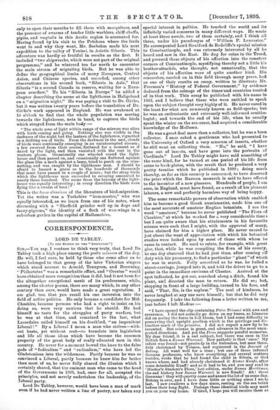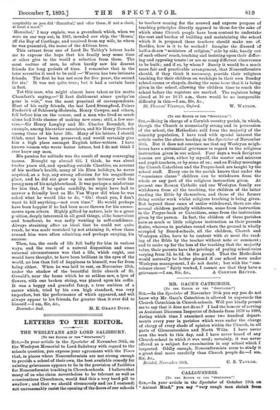CORRESPONDENCE.
LORD DE TABLEY.
[To THE EDITOR OP THE " SPECTATOR:] SIR,—You say, I venture to think very truly, that Lord De Tabley took a high place among the poeta minores of the day. He will, I feel sure, be held by those who come after us to have belonged to that group of the later Victorian singers which stood nearest to Arnold, Tennyson, and Browning.
Philoctetes" was a remarkable effort, and " Orestes " would have obtained more recognition than it did, bad it not been fcr the altogether exceptional merit of its predecessor, while, among the shorter poems, there are many which, in any other century than ours, would have made a great reputation. I am glad, too, that you recall his one incursion into the field of active politics. He only became a candidate for Mid- Cheshire, because persons who had a right to insist on his doing so, were very anxious that he should. He bad himself no taste for the struggles of party warfare, but he was at that time, and remained to the last, what Lacordaire called himself on his deathbed, "an impenitent Liberal ! " By a Liberal I mean a man who strives—with- out haste, yet without rest—to translate into legislation and life all those ideas which have become the common property of the great body of really educated men in this country. He never for a moment bowed the knee to the false' gods of " fadicalism " and "radicalism," who have led the Gladatonians into the wilderness. Partly because he was so convinced a Liberal, partly because he knew him far better than most of us, he never fully shared the illusion which I certainly shared, that the eminent man who came to the head of the Government in 1868, had, once for all, accepted the principles, and not merely undertaken the leadership, of the Irdberal party.
Lord De Tabley, however, would have been a man of mark even if he had never written a line of poetry, nor taken any special interest in politics. He touched the world and its
infinitely varied concerns in many different ways. He wrote at least three novels, two of them certainly, and I think all three, under his pseudonym of "William P. Lancaster."
He accompanied Lord Stratford de Redcliffe's special mission to Constantinople, and was extremely interested by all he heard and saw in the East. He dug for coins in the Tread, and pursued these objects of his affection into the remotest corners of Constantinople, mystifying thereby not a little his brother-attach6s, who thought, not unnaturally, that the objects of his affection were of quite another kind. His researches, carried on in this field through many years, had as one of their results an essay, written to illustrate Mr. Freeman's "History of Federal Government," by evidence deduced from the coinage of the times'and countries treated of in that work. This essay he published with his name in 1863, and I believe that those who were entitled to speak upon the subject thought very highly of it. He never cared in the least for what are commonly known as field-sports ; but he was an enthusiastic and extremely well-informed ornitho- logist; and towards the end of his life, when he usually spent the winter on the sea-coast, had acquired a considerable knowledge of the Mollnsca.
He was a great deal more than a collector, but he was a born collector. I once asked a. gentleman who had presented to
the University of Oxford a very museum of insects, Nvhether he still went on collecting them. "No," he said, "I have gone out of insects, and have gone into the portraits of Cardinals." Lord De Tabley might have said something of the same kind, for he turned at one period of his life from coins to book-plates, with the result that he produced a very pretty treatise which he published in 1880; doing much thereby, as far as this country is concerned, to have deserved the prize which the Eastern monarch is said to have offered
to the inventor of a new pleasure. Hundreds of people, I am sure, in England, must have found, as a result of his pleasant labours, a new and perfectly harmless way of being happy.
The same remarkable powers of observation which enabled him to become a good Greek numismatist, made him one of the most accurate of amateur English botanists. I use the word "amateur," because he never published "The Flora of Cheshire," at which he worked for a very considerable time ; but I am quite aware that his attainments in his favourite science were such that I might, with the approval of many, have claimed for him a higher place. He never ceased to jest about the want of appreciation with which his botanical studies were looked upon by most of those with whom be came in contact. He used to relate, for example, with great glee, that, while he was compiling the flora of his county, he one day observed that he had just time, after coming off duty with his yeomanry, to find a particular "plant "of which he was in search. Fully accoutred as he was, he bailed a street-carriage, jumped into it, and told the driver to go to a point in the immediate environs of Chester. Arrived at the spot indicated, he got out, searched along a ditch, found his plant, an directed the man to return. He did so; but, stopping in front of a large building, turned to his fare, and said, "That, Sir, is the asylum." The soul of kindness, he never laughed at any one save himself ; but that he did very frequently. I take the following from a letter written to me, just before I left Madras :—
" I have opened the slip containing Ficus Trinumi with awe and reverence. I did not actually go down on my knees, as Linnteus did on seeing the furze in full bloom, but I had some difficulty in preserving that upright position which is the privilege and dis- tinctive mark of the primates. I did not expect a new fig to be invented. But science is great, and advances in the most unex- pected directions. And yet the Picas suggests painful memories. My dear friend, it is a sad subject, but there was once in the British flora a Rumex Warrtnii. How pathetic is that once.' My infant was found—not precisely in the bulrushes, but near them. duly christened by Trimen, and registered in the Journal of Botany. All went well for a time ; but one of those infernal German professors, who know everything and several matters besides, wrote that he had found the child in Silesia, or God knows where, and had already christened it Rumex Knafii, after some detestable Kilaff ! and so it had to be, and you may read in 'Hooker's Student's Flora,' last edition, under Rumex Maritima, the sad history how Rumex Wtuvenii is now ICnafii ! Ah ! those Germans ! they will quietly come and annex the lot of us some day. Botany is over, and I have done little or nothing since I wrote last. I saw swallows a few days since, resting on the sea brink before their long flight. Perhaps these identical birds may meet you on your way home. If tired, I hope you will receive them as
mospitably as you did 'Hannibal,' and offer them, if not a chair, at least a mast."
'Hannibal,' I may explain, was a greenfinch which, when we were on our way out, in 1881, invaded our ship, the 'Rome,' 311 the Bay of Carthage, and received from my wife, to whom te was presented, the name of the African hero.
This extract from one of Lord Be Tabley's letters leads me to express the hope that his family may some time ar other give to the world a selection from them. The most recluse of men, he often hardly saw his dearest friends for long periods of time. I remember that in the later seventies it used to be said Warren has two intimate friends. The first he has not seen for five years, the second for six.' It was not quite true ; but it had a certain basis -in fact.
Yet this man, who might almost have taken as his motto Chamfort's saying,—" II faut diablement aimer quelqu'un pour le voir," was the most punctual of correspondents. Most of his early friends, the last Lord Strangford, Prince Frederick of Schleswig-Holstein, Henry Cowper, and others, fell before him on the course, and a man who lived so much alone had little chance of making new ones ; still, a few sur- vive,—Sir Henry Longley and Mr. Charles Roundel!, for example, among his earlier associates, and Sir Henry Howorth among those of his later life. Many of his letters, I should think, must have been preserved, and would certainly give him a high place amongst English letter-writers. I have known women who wrote better letters, but I do not think I ever knew any man.
His passion for solitude was the result of many converging causes. Brought up abroad till, I think, he was about twelve years old, and spending outside Cheshire, on account of his mother's health, many of his Eton holidays, he never acquired, as a boy, any strong affection for his magnificent place, and he did mot grow up in much intimacy with the young men of his neighbourhood. It was perhaps a misfortune for him that, if he spoke candidly, he might have had to answer a friendly host as Mr. Van Weyer did when he was asked what he would like to do, "Oh! thank you, I don't want to kill anything,—not even time." He would perhaps have been happier if be had been more thrown for his amuse- ments upon others. Highly gifted by nature, heir to a great position, deeply interested in all good things, alike benevolent and beneficent, he was sadly wanting in self-confidence. Always straining after an ideal that he could not quite reach, he was made wretched by not attaining it, when those around him were often admiring, and perhaps envying, his success.
Then, too, the cards of life fell badly for him in various ways, and the result of a natural disposition and some external circumstances was that a life, which ought, one would have thought, to have been brilliant in the eyes of the world, no less than full of happiness to himself, was far from being either. When he was laid to rest, on November 28th, under the shadow of the beautiful little church of St. Oswald's, near the home which he so seldom saw, a lyre of towers, with one broken string, was placed upon his coffin. It was a happy and graceful fancy, a true emblem of a career which, tried by his own high standard, was very imperfect, but the performance of which appeared, and will always appear to his friends, far greater than it ever did to himself.—I am, Sir, &c.,























































 Previous page
Previous page